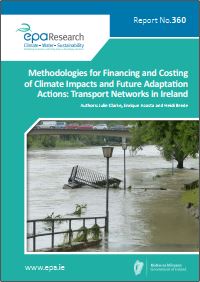Research 360: Methodologies for Financing and Costing of Climate Impacts and Future Adaptation Actions: Transport Networks in Ireland
Authors: Julie Clarke, Enrique Acosta and Heidi Brede
Summary: Climate change is happening on a global scale, and Ireland is seeing its detrimental effects. Increased stress owing to changing weather patterns and extreme storm events is and will have an impact on the transport infrastructure network. Developing resilient methodologies that quantify the social, economic and environmental costs of climate change impacts can support a decision-making framework and provide cost effective solutions.

Project Highlights
Watch the project highlights video
Identifying Pressures
Climate change is happening on a global scale, and Ireland is already seeing its detrimental effects. Rainfall, windspeed and temperatures are expected to increase in intensity and frequency over the next century; this will inevitably affect the transport sector in Ireland. Planning ahead and developing resilient and robust solutions to the challenges at hand is vital to prevent significant economic losses.
Informing Policy
It became evident from stakeholder workshops that information and data relevant to several sectors and regions in Ireland are lacking or not easily accessible. Coherent data collection and use and awareness raising of existing tools and resources should be co-ordinated nationally, with a particular focus on mapping out and quantifying climate-related hazards, as these are key to avoiding potential cost or economic losses in the future. This would assist in improved information provision to policy makers and relevant sectors.
Developing Solutions
There is a need for development of methodologies that quantify the social, economic and environmental costs of climate change impacts, as well as the benefits of adaptation planning options. In order for adaptation planning to be useful, it must be applied correctly. It must also be economically justifiable. Quantitative risk assessments (QRAs) are a useful tool for evaluating the cost of climate change on the transport network, albeit QRAs are not without their weaknesses. However, the future is uncertain and decision-making without knowing all the facts is often inevitable. To overcome this, a robust decision-making framework and other useful tools can be adopted in order to find solutions that are cost-effective, flexible and beneficial for a wide range of future scenarios.
https://www.epa.ie/media/epa-2020/publications/research/Thumbnail_360.jpg